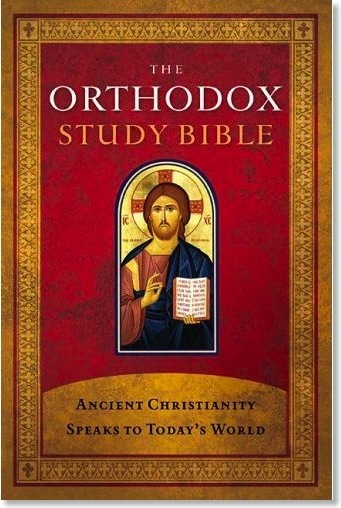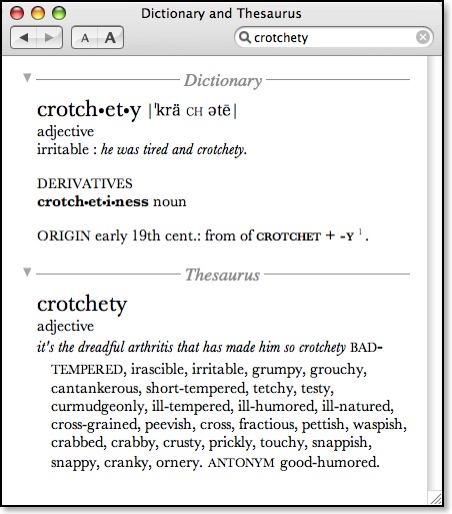The Orthodox Study Bible (A Guest Review)
The Orthodox Study Bible

I was fortunate enough to participate with some of the translation of the LXX text, so let me briefly cover the translation methodology that was used. This is not a wholly fresh translation, but will follow the NKJV translation tradition, except for the “Greek” books. This is for at least two reasons. First, it will keep a consistent NKJV flavor found in the New Testament. This is important for us, because so much of this will be read liturgically and therefore the sound of the text matters. Second, there are production issues. Apparently producing a completely fresh translation on a large scale is very costly. Revisions are cheaper, and in many ways this will be a revision of the NKJV. Therefore, the methodology used was to change the NKJV text only where it deviated from the LXX. As a translator this was difficult, and required a lot of restraint. At times, I felt I could phrase a passage better than the NKJV, but unless it changed the meaning I tended to leave it alone. This probably points to a third reason for using this method. It makes the editorial process much quicker. The editors had to spend their time on much fewer words than in full blown translation.
Only recently has LXX translations come into vogue. Yet, the ones that are available are not available on a widespread basis, so this will be the first popular English translation of the LXX to be published by a major American Bible publisher. In fact, the last time this was done was by Lancelot Brenton in 1851. Why is this necessary or important? For Orthodox this is an easy answer---it is our official OT text. To explain the value to other Christian groups, a little background on the LXX is needed. After the Jews became scattered due to the Babylonian captivity and other conquests of Israel, many Jews were unable to read Hebrew. Greek had become the language of the Jewish Diaspora. In order to retain Biblical literacy among Judaism, Jewish scholars in Alexandria from approx. 3rd-1st century BC decided to translate their Hebrew Bible into Greek. Traditionally 72 scholars worked on the project which if you round down to 70 you get the name of the translation--the Septuagint (LXX). The LXX gained widespread use throughout the Diaspora and even in Jerusalem. The Jewish scholars Philo and Josephus seem to rely on the LXX when they quote the OT. For Christians, the importance came during the construction of the NT. A simple cross reference of OT quotations in the NT will show their divergence from the Masoretic text in places. In fact, the Apostles quote most often from the LXX rather than a Hebrew version. When looking at the more complete OT quotations in the NT nearly one hundred agree with the LXX and six agree with the Masoretic Text. What makes this more significant is that most of these quotes deal with prophecies concerning Christ. As a result, the LXX became the Bible of the early church, and has continued to be the OT of the Orthodox Church. The Jews of the 2nd century eventually dropped the use of the LXX. There are probably many reasons for this, but a prime reason was that Christianity had embraced its use and they needed to distance themselves from their rival religion. Also, our oldest extant manuscripts of the OT are from the LXX (4th century AD) and the oldest complete Hebrew OT (Leningrad Codex) was copied around 1000 AD. For these reasons it is important that Christians today can read the Bible used by the Apostles to spread the Gospel throughout the Roman world.
As a side note, there is a tradition regarding the translation that is too fascinating not to mention. The tradition revolves are the person of the righteous Simeon who received the infant Christ as His presentation in the Temple. According to this tradition he was the LXX translator of Isaiah. This would have made him around 200 years. Apparently when he was translating Isaiah 7:14 he debated over whether to translate "almah" with the Greek for virgin or young woman. Virgin seemed impossible to him, so he was about to write young woman and an angel stopped his hand. The angel told him to use virgin, and to confirm the truth of the word choice the righteous Simeon would live to see the fulfillment. This definitely gives a unique perspective on Simeon's words "now let your servant depart in peace" (Luke 2:29).
Now for the review of the Bible. Let me give some basic features of this Bible that make it unique beyond the translation, then follow with a brief evaluation of positive elements and elements that could be improved or revised in future editions. One of the more immediate differences one will notice is the order of the OT books. The "Greek" books are integrated into the contents rather than separated out in an Aprocryphal setting. Here is the list of books: Genesis, Exodus, Leviticus, Numbers, Deuteronomy, Joshua, Judges, Ruth, 1 Kingdoms, 2 Kingdoms, 3 Kingdoms, 4 Kingdoms, 1 & 2 Chronicles, 1 & 2 Ezra, Nehemiah, Tobit, Judith, 1,2,&3 Maccabees, Psalms, Job, Proverbs, Ecclesiastes, Song of Songs, Wisdom of Solomon, Wisdom of Sirach, Hosea, Amos, Micah, Joel, Obadiah, Jonah, Nahum, Habakkuk, Zephaniah, Haggai, Zechariah, Malachi, Isaiah, Jeremiah, Baruch, Lamentations, Epistle of Jeremiah, Ezekiel, Daniel. Yes, its going to take a while to find verses quickly because of the different ordering. One of the surprises is that the editors chose to use the common English names of the books rather than their Greek equivalent, except in the case of Kingdoms. For example, Jonah would have been Jonas, Ezra would be Esdras, etc. However 1 & 2 Kingdoms is called 1 & 2 Samuel in modern English translations. The editors stayed with this same name and place format throughout the translation. I think this was helpful rather than having to relearn names. Even though most could figure out that Elias is Elijah, it could create confusion for Bible newbies.
The Psalter includes Psalm 151 and uses the LXX numbering rather than the Masoretic. However, the Hebrew numbering is placed in parantheses when different. One reviewer has complained about the versification. In most cases this will match the Hebrew version, although there are places where there are more verses than the Hebrew has and often these are inserted in the midst of chapters. Other versions of the LXX have left out the verse numbers in these places or divided it out using letters such as 11a, 11b, 11c, etc. In those places the editors chose to create their own system of versification, which may cause some confusing when comparing LXX to Hebrew passages.
Being a study Bible, it does contain notes at the bottom of each page which is helpful. I found them not to be overwhelming and in the most cases very helpful. The vast majority of notes are direct comments from the Church Fathers. This is a feature that could be beneficial to non Orthodox Christians. Among modern Christians the voice of the Fathers regarding Scripture is unknown, so it is nice to see what John Chrysostom says versus C.I. Scofield. Other notes tend to have a Christological or Trinitarian emphasis. Also interspersed throughout the Bible are various articles and 21 of the articles are specific to OT themes such as Theophanies of Christ, Ancestral Sin, Christ our Passover, etc. Also at the bottom of each page, a text is noted if used liturgically in the Orthodox church. This my not be useful to non-Orthodox, but for Orthodox it provides a nice context to how the Church understands a particular passage.
Overall, I am very pleased with the outcome of the text, and I think it is a welcome addition to English Bibles and can be a great benefit to non-Orthodox believers as well.
The Orthodox Study Bible is available in hardcover and bonded leather. It runs 1,822 pages and is roughly an inch and a half thick. It can be pre-ordered from most retail outlets.
Theron can be reached at mathis5fam@yahoo.com, and be sure to join the discussion in the comments section.
Coming Soon: The George Costanza/Passion Experience
There's not a whole lot that's new here if you keep up with these things. Some folks--publishers and readers alike--still seem surprised at how well the Bible sells:
The familiar observation that the Bible is the best-selling book of all time obscures a more startling fact: the Bible is the best-selling book of the year, every year. Calculating how many Bibles are sold in the United States is a virtually impossible task, but a conservative estimate is that in 2005 Americans purchased some twenty-five million Bibles—twice as many as the most recent Harry Potter book. The amount spent annually on Bibles has been put at more than half a billion dollars.
In some ways, this should not be surprising. According to the Barna Group, an evangelical polling firm, forty-seven per cent of Americans read the Bible every week. But other research has found that ninety-one per cent of American households own at least one Bible—the average household owns four—which means that Bible publishers manage to sell twenty-five million copies a year of a book that almost everybody already has.
The article primarily focuses on all the many niche Bibles that are out there for everyone from skaters to surfers and describes the history of modern Bible publishers. I'm not opposed to targeting the Word of God toward niche markets, but I hope that carriers of these specialty Bibles eventually get around to reading the Scriptures themselves. I realize that I'm not the market for these Bibles, since overall I prefer a plain text (with wide-margins, of course), and I usually keep a study Bible close by for quick reference before I hit the commentaries and other reference books. I also wonder sometimes if such specialty Bibles don't over-individualized readers or specific groups of readers. To me what is definitely over the line is the “The Personal Promise Bible [which] is custom-printed with the owner’s name ('The LORD is Daniel’s shepherd'), home town ('Woe to you, Brooklyn! Woe to you, New York!'), and spouse’s name ('Gina’s two breasts are like two fawns')." Yikes.

Okay, he probably didn't say "blazes," but that's how I like to remember him. He was the kind of grumpy old prof you expect to say something like that. I looked behind me and saw a display with multiple copies of the Experiencing God Study Bible which our company had required us to place prominently behind the counter even though our customers were probably not target audience for such.
I explained to him that this was essentially a copy of the NKJV with notes from Henry Blackaby, the writer of Experiencing God, interspersed throughout the text. The OT professor wrinkled his brow, harumphed, and declared, "Well, I remember a day when the Bible itself was all you needed to get by." I smiled politely and didn't say what I wanted to--namely that "If that were true, you and I would both be out of a job." I also didn't point out the irony in the fact that he required the Oxford Annotated Study Bible in his OT Intro classes.

Interesting. No name was mentioned for this new project. Therefore I propose The George Costanza/Passion Experience.









